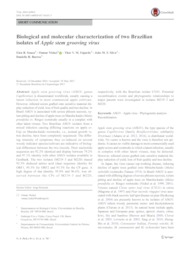Biological and molecular characterization of two Brazilian isolates of Apple stem grooving virus.
Biological and molecular characterization of two Brazilian isolates of Apple stem grooving virus.
Authorship: SOUZA, E. B.; NICKEL, O.; FAJARDO, T. V. M.; SILVA, J. M. F.; BARROS, D. R.
Summary: Apple stem grooving virus (ASGV, genus Capillovirus) is disseminated worldwide, usually causing a latent infection in most commercial apple cultivars. However, infected scions grafted onto sensitive material display reduction of yield, loss of fruit quality and tree decline. In Brazil ASGV is associated with severe phloem necrosis, xylem pitting and decline of apple trees on Maruba-kaido (Malus prunifolia cv. Ringo) rootstocks usually in a complex with other latent viruses. Two Brazilian ASGV isolates from a mixed infection causing differing reactions on apple cv. Fuji on Maruba-kaido rootstocks, i.e., normal growth vs. tree decline, have been completely sequenced. The differing intensity of symptoms they co-induced on several woody indicator species/cultivars are indicative of biological differences between the two inocula. Their nucleotide sequences are 92.2% identical and display between 79.2% and 97.1% identity with other ASGV isolates available in GenBank. The two isolates (M219-3 and M220) shared 92.3% deduced amino acid (daa) sequence identity for ORF1, 95.3% for ORF2 and 93.3% for the CP gene. A high degree of daa identity, 95.8% and 96.6%, was ob- served between the CPs of M219 ? 3 and M220, respectively, with the Brazilian isolate UV01. Potential recombination events and phy logenetic relationships to major parents were investigated in isolates M219 ? 3and M220. Keywords ASGV . Apple virus . Phylogenetic analysis . Recombination
Publication year: 2017
Types of publication: Journal article
Unit: Embrapa Grape & Wine
Observation
Some of Embrapa's publications are published as ePub files. To read them, use or download one of the following free software options to your computer or mobile device. Android: Google Play Books; IOS: iBooks; Windows and Linux: Calibre.
Access other publications
Access the Agricultural Research Database (BDPA) to consult Embrapa's full library collection and records.
Visit Embrapa Bookstore to purchase books and other publications sold by Embrapa.

